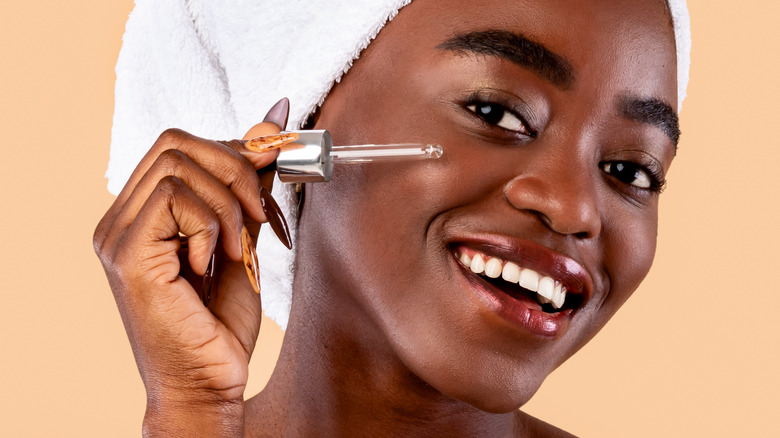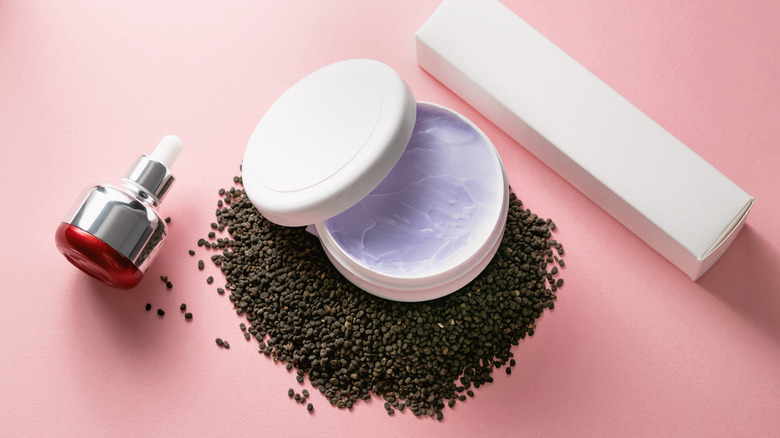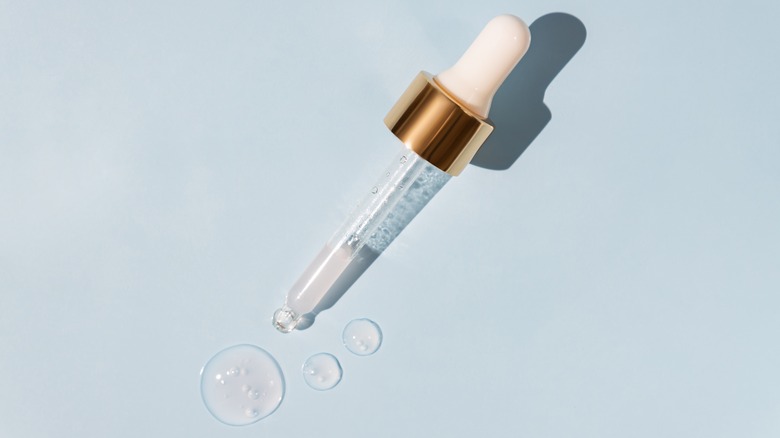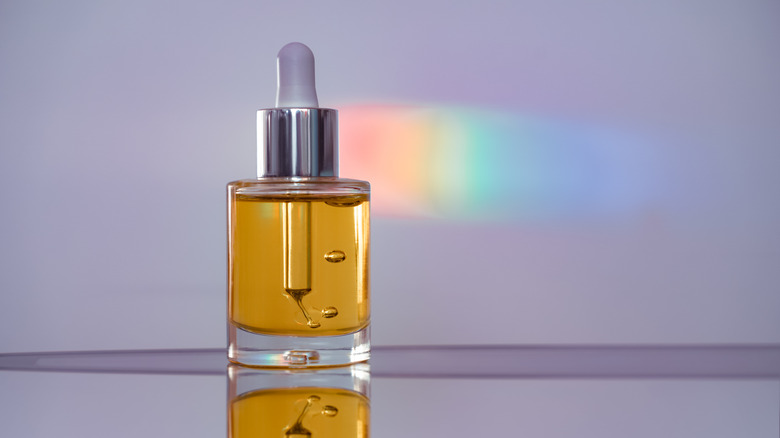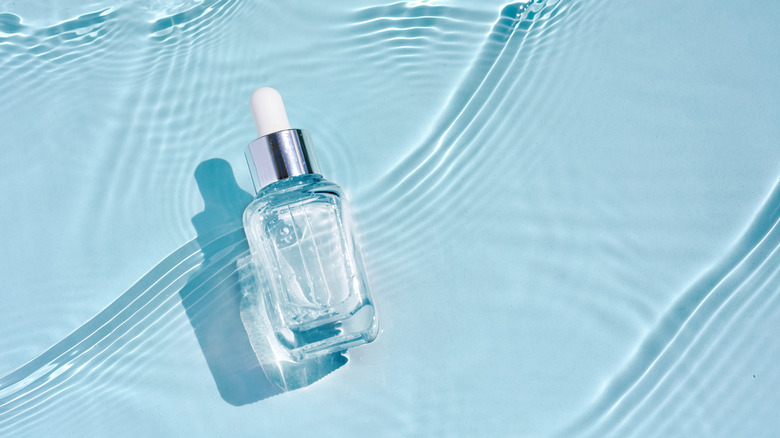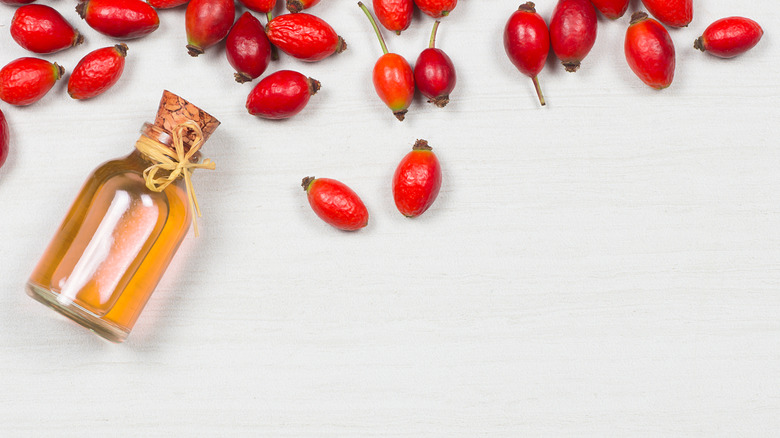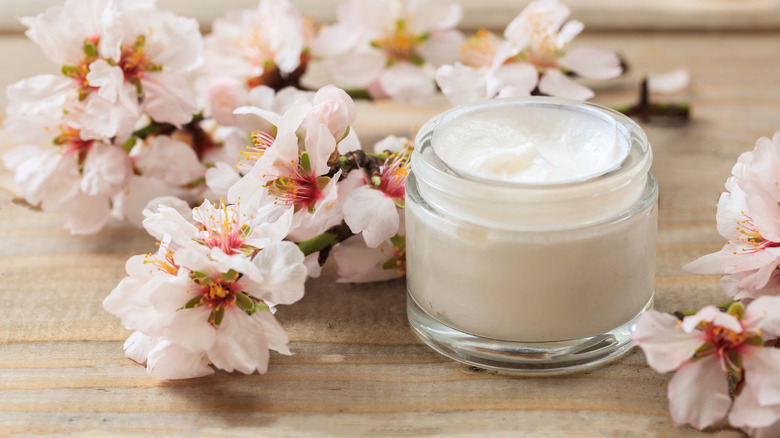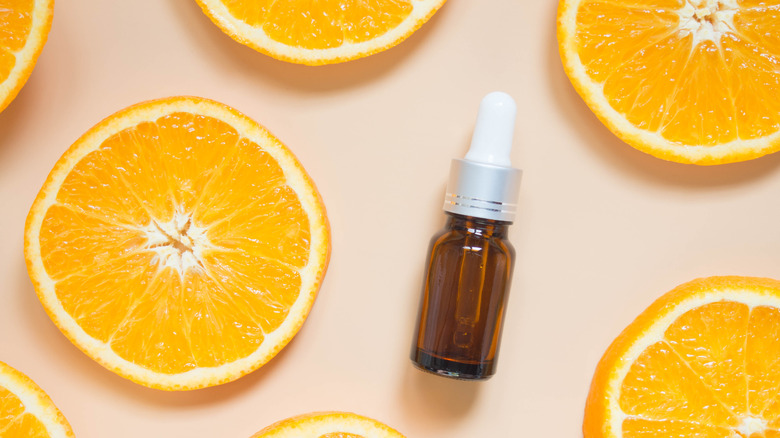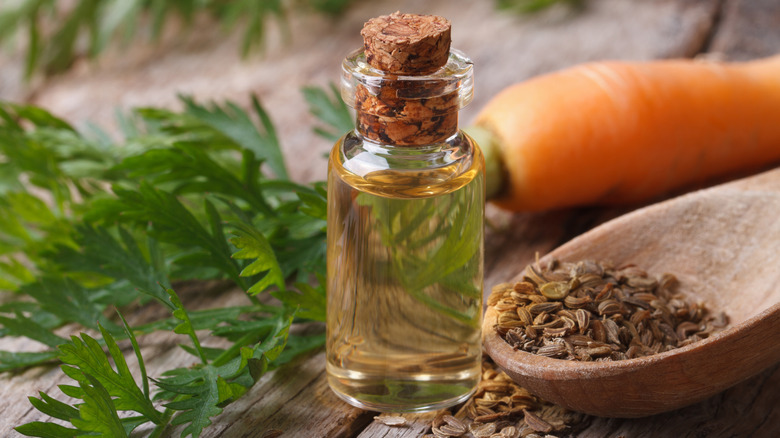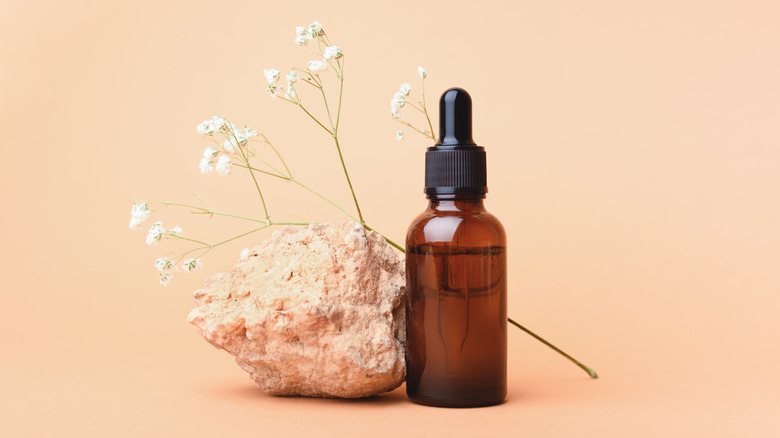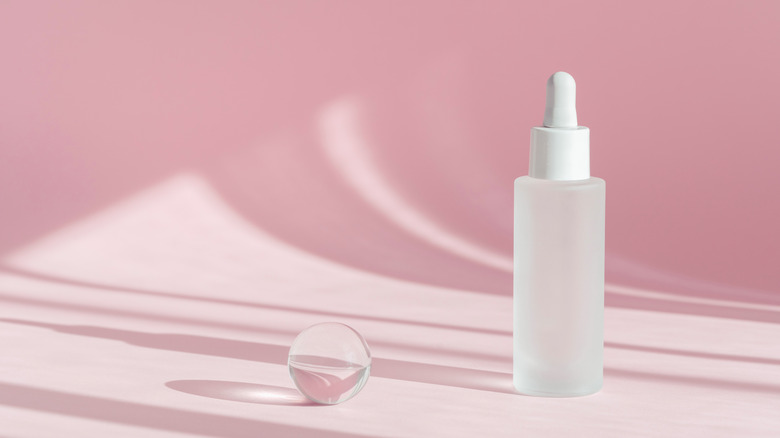Ingredients To Try Instead Of Retinol If You Have Sensitive Skin
If you're plugged into the world of skin care, then you've probably heard the buzz about retinol. Touted as the gold standard for skin care ingredients, retinol is prized by experts and beauty aficionados alike. According to board-certified dermatologist Dr. Ekama Carlson, retinol's glowing reputation is well-earned. "Retinols have numerous cosmetic dermatologic benefits, such as stimulating collagen production, shrinking oil glands, minimizing the appearance of large pores, improving skin turnover, and exfoliation of dead skin — all of which help counteract visible signs of aging skin," Carlson told The List.
How can one little ingredient do so much? According to Healthline, retinol — which is actually a form of vitamin A — is easily absorbed in the skin and works by bolstering the natural production of elastin and collagen. But before slathering on this popular skin food, there are some caveats to consider. For one, retinol can be quite intense — especially during the first few weeks of treatment. Dryness, burning, stinging, and redness are a few common side effects of retinol. To decrease these potentially harsh reactions, experts recommend starting your retinol journey with a very small amount applied roughly twice per week. However, even with a cautious approach, retinol won't be suitable for some faces.
If your sensitive skin won't tolerate retinol, then it may be time to ditch the ingredient for a gentler stand-in. We asked skin care experts for the scoop on their favorite retinol alternatives.
Bakuchiol
For skin care benefits and anti-aging results, bakuchiol could easily go toe-to-toe with retinol. Best of all, it's gentle enough for all skin types. Bakuchiol is a natural ingredient made from babchi plant extract. The healing properties of babchi are widely embraced by practitioners of Chinese and Indian medicine — and more recently, they've received massive attention from skin care enthusiasts.
According to Dr. Anju Methil, bakuchiol measures up to retinol in terms of boosting collagen production and improving the tone and texture of your skin. "Given its gentle nature, it provides a safe and effective option for people with sensitive skin who desire to reduce the signs of aging," Methil told The List. " It is less expensive than retinol and provides long-term benefits. It can help to reduce the appearance of wrinkles and discoloration, without exacerbating any existing inflammation or redness." And unlike retinol — which causes photosensitivity — bakuchiol won't leave your skin irritated by sun exposure.
One small clinical study from the British Journal of Dermatology found that bakuchiol was as effective as retinol at smoothing wrinkles and correcting hyperpigmentation. And since bakuchiol is so gentle, you don't have to worry about overdoing it when you put the product on. As Byrdie notes, this skin care powerhouse is suitable for twice-daily application.
Peptides
Peptides are another heavy-hitter in the skin care game. These compounds occur naturally in the body, and they help generate the proteins that build healthy skin. Similar to retinol, skin-penetrating peptides stimulate the production of collagen and elastin, which firms the skin and reduces fine lines and wrinkles. Peptides might also fortify the skin's natural barrier function, making it less vulnerable to sun damage and other signs of aging.
Valerie Aparovich, a biochemist and science team lead at OnSkin, confirmed that peptides are gentle and effective on delicate skin. "Both peptides and retinol possess great anti-aging properties, but peptides help achieve the desired effect without the risk of dryness, irritation, or other disturbing skin conditions," Aparovich told The List.
Like other retinol alternatives, peptides don't perform quite as well as retinol in the anti-aging department. As Methil explained to us, this is because nothing else measures up to the potency of retinol. That said, some people can tolerate retinol better when combining it with a gentler ingredient like peptides. "For those looking for more dramatic effects, I recommend incorporating a combination of both retinol and these alternatives. This way, you can get the best of both worlds," Methil suggested.
Niacinamide
Thanks to its dietary benefits, niacinamide — a form of vitamin B3 — already has a healthy reputation. But it's also nourishing for your skin. According to Healthline, niacinamide helps promote the formation of new proteins and lipids, which increases firmness and hydration. It's also a powerful antioxidant that helps safeguard your skin against damage from UV rays, air pollutants, and other environmental toxins. Like retinol, niacinamide is effective at shrinking pores, reducing hyperpigmentation, and softening fine lines and wrinkles.
To boost your skin's resilience, U.K. board-certified dermatologist Dr. Ahmad Chaudhry recommends this supercharged ingredient. "One of the main benefits of using niacinamide is its ability to improve the skin's barrier function. It helps to strengthen the skin's protective barrier, which can reduce moisture loss and improve overall skin health," Chaudhry told us.
Plus, it's suitable for even the most sensitive skin. According to board-certified dermatologist Dr. Alpana Mohta, niacinamide is beneficial for people with conditions like acne, rosacea, and eczema. When it comes to anti-aging, niacinamide works differently than retinol. "Retinol increases cell turnover and collagen production, which can reduce the appearance of fine lines and wrinkles," Mohta told The List. "Niacinamide, on the other hand, improves the skin's moisture barrier and reduces inflammation, which can lead to an overall improvement in skin texture and tone." Chaudhry added, "While it may not be as powerful as retinol in terms of anti-aging benefits, it is still a valuable addition to any skin care routine."
Alpha hydroxy acids
If you're going for glowy, rejuvenated skin, alpha hydroxy acids (AHAs) are a worthwhile ingredient. There are several different types of AHAs, and each of these naturally-derived compounds varies in origin and strength. In skin care products, the main AHAs that you'll encounter are glycolic acid, citric acid, and malic acid — all of which are developed from plants — and lactic acid, which comes from milk. AHAs are best known as powerful exfoliants. These ingredients work by gently dissolving dead skin cells, which promotes a smooth, luminous complexion. Thanks to their mildness, AHAs are the ideal exfoliator for skin that can't tolerate coarse brushes or face scrubs.
For some individuals, AHAs can cause irritation. To minimize harsh effects, Byrdie recommends trying an AHA face cleanser to see how your skin will react before adding a topical to your skin routine. Additionally, Medical News Today cautions that those with darker skin tones may experience pigment changes when using AHAs.
Like retinol, AHAs can effectively treat hyperpigmentation and repair sun damage. Dermatologist Dr. Fazeela Abbasi explained that while AHAs don't offer quite the same wrinkle-blurring potency as retinol, they do possess some anti-aging benefits. "AHAs work by resurfacing the skin and removing dead and damaged surface cells — which encourages the growth of the newer, healthier skin beneath," Abbasi told The List. "They can also 'peel away' the fine lines and uneven pigmentation associated with the aging process."
Rosehip oil
If you're looking for a gentle skin care ingredient that does it all, we recommend jumping on the rosehip oil train. As the name suggests, this ingredient is derived from rose bushes — more specifically, from the seeds and fruit of the plant. Rosehip oil contains a variety of nutrients that rival the skin-refining and anti-aging benefits of retinol. It's also mild enough for all skin types. Unlike retinol, which can cause dryness, rosehip oil contains essential fatty acids that hydrate the skin. This superstar ingredient also contains vitamin C, which helps minimize skin damage and early signs of aging. As Byrdie notes, rosehip oil has even been shown to reduce the appearance of scars.
Rosehip oil also contains vitamin A – the same age-reversing compound that constitutes retinol. Since rosehip oil is less concentrated than retinol, it's not quite as effective at reducing fine lines and wrinkles.
Still, as Aparovich explained, rosehip oil delivers a bevy of other hype-worthy benefits. "Rosehip oil won't give such visible and quick results as retinol, but it greatly contributes to overall skin texture and complexion improvement," Aparovich told The List. "Its healthful ingredients will increase skin hydration levels, firmness, elasticity, radiance, and brightness. On plumper, even-toned skin, the signs of aging — including fine lines, wrinkles, and hyperpigmented spots — become less noticeable."
Growth factors
They say that beauty comes from within. But we're not talking about your personality here — we're talking about a skin care ingredient that already exists in your body. Growth factors are proteins that signal messages from one cell to another. They instruct the cells to perform specific functions, including growth, collagen production, and much more. Since their discovery in the 1950s, growth factors have been used medically to accelerate wound healing — but their ascension to skin care majesty is a bit more recent. As dermatologist Dendy Engelman explained to Allure, "They take cues from the surrounding tissue ... so if you put them on the skin, they help generate new skin cells; hence, younger-looking skin."
Since they originate in the human body, you might have already guessed that growth factors are typically generated from human cells. However, some beauty brands bioengineer their growth factors in laboratories. A study from the Journal of Cutaneous and Aesthetic Surgery suggests that growth factors can reduce wrinkles and hyperpigmentation, as well as improve skin's elasticity. And because they don't cause dryness, they're ideal for sensitive skin.
"When compared to retinol, growth factors are more effective at stimulating the skin's own repair mechanisms in order to restore a youthful complexion," Methil told The List. "Growth factors work by signaling cells in the skin to increase their activity, whereas retinol works by increasing cell turnover rate and encouraging new cell growth."
Sea buckthorn oil
If you're a fan of superfoods, then you'll love the idea of giving your face this nutrient-packed treat known as sea buckthorn oil. Sea buckthorn oil comes from the berries of sea buckthorn, a type of shrub. According to an expert for Byrdie, this powerhouse ingredient is 10 times richer in vitamin C than an orange. It also contains a hefty helping of antioxidants, which provide a layer of armor against skin-damaging UV rays and airborne toxins.
According to Dr. Anna H. Chacon, an author and board-certified dermatologist, sea buckthorn oil can be used to tackle the same skin issues that retinol targets. "The natural abundance of antioxidants present in sea buckthorn oil — which includes carotenes, vitamins E and C, flavonoids, and vital fatty acids — makes it a common ingredient in beauty products," Chacon told The List. "It is also supposed to help reduce any post-inflammatory hyperpigmentation and can enhance the overall tone and texture of your skin." Plus, it's rich in vitamin A – the same vitamin that gives retinol its age-defying power.
Sea buckthorn oil delivers a hydrating bounty of skin nourishment. And it's gentle enough for sensitive skin. However, those with acne-prone skin should test a small amount before fully committing to this ingredient. Additionally, sea buckthorn oil is not recommended for use prior to surgeries or facial treatments.
Vitamin C
Of all the skin care ingredients on our list, you've probably heard the most about vitamin C serums. After all, most of us are familiar with this immune-boosting vitamin that's abundant in foods like citrus fruits, broccoli, and bell peppers. Vitamin C isn't only good for your insides — it can also help you achieve healthy, radiant outsides.
Like retinol, vitamin C helps even out skin tone and reduce dark spots. With the added bonus of skin-revitalizing antioxidant power, this gentle ingredient packs a punch. Vitamin C also promotes collagen synthesis, which can aid in the reduction of fine lines and wrinkles. According to Harvard Medical School, limited research suggests that vitamin C visibly diminishes fine lines, wrinkles, and other telltale signs of aging.
With a slew of benefits and a strong reputation to boot, it's no wonder that vitamin C is featured in countless skin care products. And while the prestige is well-earned, it is important to note that vitamin C doesn't quite measure up to retinol's wrinkle-fading power. Still, there are ways to maximize the anti-aging benefits of vitamin C, as expert Natali Kelly explained to Woman & Home. "I would recommend a concentration of at least 10% and also to look for products containing ascorbic acid (also known as L-ascorbic acid), as this has the most skin research of any form of vitamin C and is shown to be effective," Kelly told the publication.
Carrot seed oil
Remember when you were a kid, and adults were always telling you that carrots are good for your eyes? Well, it isn't carrots themselves that promote good health — rather, it's what's in them.
Carrots contain an antioxidant called beta-carotene, which helps protect the body's cells from being damaged by an excess of unstable molecules known as free radicals. Free radicals are a byproduct of normal metabolic functions, but they can also come from environmental conditions like toxins, UV radiation, and air pollutants. Considering that your skin comes into contact with so many of these environmental factors, it's not surprising that antioxidant-rich carrot oil is a first-rate skin care ingredient.
According to Dr. Rosmy Barrios, a medical adviser for the Health Reporter, carrot oil delivers skin-treating effects similar to those of retinol, but it's a much gentler option. "Carrot seed oil is an essential oil which is extracted through cold-pressing carrot seeds," Barrios told The List. "It's rich in beta-carotene, which is a precursor to vitamin A. If you look at retinol, it's a form of vitamin A, so that's the first similarity carrot seed oil shares with it. It can be converted to mild forms of retinol at low levels, which means it's not as potent to cause irritation on your skin. This makes it a better alternative for sensitive skin."
Azelaic acid
If you're one of those unlucky souls with skin that is both sensitive and acne-prone, finding the right skin care product can be a real nightmare. Acne-fighting ingredients often cause dry, flaky skin; and if you try to fight back with a moisturizer, you could end up clogging your pores and causing new breakouts. We know — it's a struggle out there.
Fortunately, azelaic acid can be a game-changer for troublesome skin. This ingredient is favored by experts like Dr. Usama Syed, a board-certified dermatologist. "Azelaic acid is derived from grains and has gentle exfoliating properties, making it effective in improving skin texture and tone," Syed told The List. "I especially recommend azelaic acid for my patients who have rosacea, for whom retinols are often too aggressive."
Azelaic acid encourages the growth of new skin cells, which can help soften fine lines and wrinkles. However, the effects aren't as powerful or as immediate when compared to retinol. Still, the skin-soothing benefits of azelaic acid are too good to pass up. That's why it's recommended by experts like Josh Sim, the founder of skin care brand Monteceuticals. "Unlike retinol, Azelaic acid can also fight inflammation and is antimicrobial, meaning it's the perfect option for those with acne-prone skin who want a smoother complexion over time," Sim told The List.
Squalane
Last but not least, squalane is an ingredient that can help you achieve your skin care goals without the harsh effects of retinol. Squalane is a hydrogenated, plant-derived oil with powerful defensive and hydrating properties. It is modeled after squalene (with an "e"), a component of the oil that occurs naturally in your skin. That natural oil dissipates during the aging process, causing the skin to lose moisture and compromising its natural protective barrier.
As Chacon explained, squalane can help refresh your skin's vital oil supply. "It stops transepidermal moisture loss and aids in restoring the skin's natural barrier function. Squalane is kind to the skin and suitable for all skin types, including those with sensitive skin," Chacon told The List.
If you're a skin care buff, then you already know that dryness can cause fine lines and wrinkles to look more pronounced. That's why hydration is a top priority in the quest for healthier, ageless skin. Counter to retinol — which can have a drying effect — squalane promotes a radiant, youthful complexion by helping your skin generate a stronger moisture barrier. Plus, this ingredient is gentle enough for use with rosacea and eczema. And while it lacks the superior anti-aging qualities of retinol, squalane does promote collagen synthesis, which can lead to some reduction in fine lines and wrinkles. If you're looking to tackle dark spots, this gentle moisturizer can be paired with vitamin C.
